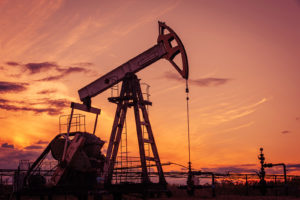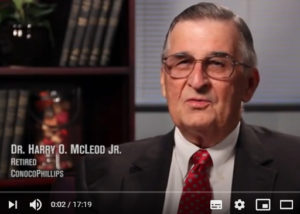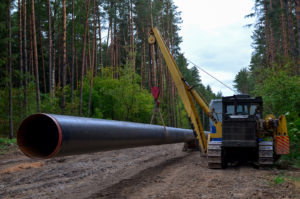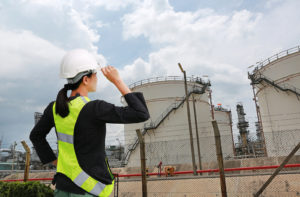Only a small proportion of oil and gas flows out from the earth under natural forces, so petroleum engineers develop and use different methods to extract these resources. They might inject water, chemicals, gases, or steam into an oil reservoir to force out more of the oil. Petroleum engineers also research and adapt existing technology to help increase recovery efficiency and lower the cost of drilling and production operations.
Some petroleum engineers focus on production challenges, identifying, testing, and implementing methods for improving oil and gas production. Or, they might focus on economics, helping a team to evaluate the optimum number of wells for a specific location or operation. A petroleum engineer may also focus on safety issues, or maintenance support, identifying and planning upgrades of equipment or systems currently in place.
What makes it unique?
Oil and gas are located throughout the world – often offshore — and our population relies on these fuel sources to heat our homes, power our factories, and support modern culture. Petroleum engineers work to reduce environmental impact while providing the resources needed to power our world. They work closely with geologists and environmental specialists in teams, along with engineers with dedicated specialties necessary to do the job.
 Degree Connections
Degree Connections
The following are examples of some accredited degrees leading to a career in petroleum engineering:
- Petroleum Engineering
- Production Engineering
- Energy Engineering
- Mechanical Engineering
- Chemical Engineering
- Civil Engineering
- Geological Engineering
- Environmental Engineering
- Computer Engineering
- Electrical Engineering
Search our global database of accredited engineering programs.
Want to learn more?
Click on the blue tabs to explore the field in more detail and learn about preparation and employment, the green tabs to be inspired by people working in petroleum engineering and how they impact the world, and the orange tabs for ideas on how to learn more and you can get involved with activities, camps, and competitions!
Explore
A Day in the Life

bigstock.com/ anatoliy_gleb
The type of job a petroleum engineer has will often determine whether how much they work inside or outside. Many petroleum engineers work on job sites, but others work in an office setting. A consultant to the financial industry, for example, may spend most of their time working in an office setting. There are strong international travel opportunities for petroleum engineers, as it is very much a global business. Many companies have offices and sites in multiple countries and transfers are common.
In terms of tasks or projects, petroleum engineers design equipment to extract oil and gas from onshore and offshore reserves deep underground, and also develop plans to drill in oil and gas fields. They develop ways to inject water, chemicals, gases, or steam into an oil reserve to force out more oil or gas, and offer supervisory guidance to help ensure oilfield equipment is installed, operated, and maintained properly. They incorporate computers to evaluate well efficiency and work in teams with others on a daily basis.
Historical Snapshot: Advances in Petroleum Technology
Petroleum Technology

Bigstock.com/ Nataliia2910
Advances in engineered technologies used for well drilling have made it possible for the energy industry to reach new sources of oil and natural gas. This field is a great example of how engineering can impact the availability of products and resources and improve efficiency.
Consider that first oil well was drilled in 1848 in Azerbaijan using a technique that originated in ancient China. It included a cable-tool drilling technique and was therefore dug by hand. In 1859, oil was first discovered in the US in Pennsylvania, using a homemade rig.
But once discovered, and as applications expanded, the drive to locate, extract and transport oil and gas expanded as well. The first oil tanker began delivering oil on the Caspian sea in 1878. Over time, engineers advanced the methods for drilling and extracting, developing improved designs for drilling tools and considering different approaches such as horizontal well drilling, hydraulic fracturing, and off shore drilling rigs, which were introduced in 1949. Semisubmersible drilling was introduced in 1962, and deep water coring began in 1965. 1972 saw the development of mud-pulse telemetry, which enabling accurate determination of bit location while drilling. And these are just a few examples.
Now there is multilateral drilling, which allows drillers to branch out from a main well to take advantage of resources nearby. Extended reach drilling allows for drilling under environmentally sensitive areas where drilling directly down would be inappropriate. And, complex path drilling creates well paths with twists and turns to try to hit multiple sources from a single well location.
Find out more:
Industries and Employment

bigstock.com/ bashta
Large oil and gas companies maintain operations around the world so petroleum engineers have global career options. They work mostly in oil and gas extraction, professional, scientific and technical services, and petroleum refining. Employers include major oil companies and hundreds of smaller companies that focus on production, research institutes, and consulting.
The following is just a sample of some companies, in addition to government agencies, which employ petroleum engineers:
Preparation and Degrees

bigstock.com/ artitcom
For most engineering careers:
- a bachelor’s degree is required
- a master’s degree may be recommended for those specializing or interested in management
- students may also start with a related associate degree and then move on to a bachelor’s when they have settled on a degree path.
- many students are required to participate in a co-op program while at university to gain real world experience in their chosen field.
- education doesn’t really stop…engineers need to stay current as technology changes and materials and processes improve over time.
- many professional societies offer certificates and coursework to support continuing education for their members.

Bigstock.com/ LuckyStep48
At the undergraduate level, degrees would cover basic engineering and then specialize on topics such as reservoir petrophysics, petroleum engineering systems, physical geology, drilling and production systems, geostatistics, well performance, reservoir fluids, petroleum project evaluation, engineering ethics, and well completion and stimulation.
It is important to select an engineering degree that has been accredited to meet basic standards. Find out more and browse TryEngineering’s global database of accredited engineering and computing programs.
Be Inspired
Amazing Engineers!
One of the best ways to explore what it might be like to work in petroleum engineering is to learn about people currently working in the field.
- Harry McLeod has devoted his career to evaluating well behavior and making continuous improvements to project technology. Over his career, he made an impact on artificial-lift and hydraulic-fracturing systems; developed a formation analysis technique for evaluating wells. View his oral history preserved by the Society of Petroleum Engineers to the right.
- Hala Hashmi is a Senior Reservoir Simulation Engineer of Parex Resources and shares her inspiring story as a trailblazing engineer in an interview with the Society of Women Engineers.
- Leon Robinson enjoyed a 39-year career at Exxon and made contributions in many technology areas such as: mud cleaners, explosive drilling, drilling data telemetry, subsurface rock mechanics, and drilling and hydraulic optimization techniques, tertiary oil recovery, on-site drilling workshops, world-wide drilling fluid seminars and rig site consultation.
- Read or watch the oral histories of other petroleum engineers organized by the Society of Petroleum Engineers.

Global Impact: Offshore Oil Drilling Operations

bigstock.com/ PHOTOCREO Michal Bednarek
The 1950s saw the development of the offshore oil industry and opened the door to securing oil previously locked under the sea. Petroleum engineers at the time had broad knowledge of land-based drilling but had to expand their knowledge to include how a building and drilling operations could be safely situated in the ocean…especially during hurricanes and other weather events. They partnered with specialists in other engineering disciplines including marine engineering, civil engineering, as well as oceanographers to develop plans and standards to make ocean drilling possible. The original shallow-water drilling barges grew into mobile platforms, barges, and into semisubmersible and floating drilling ships.
Technically, offshore drilling is achieved with a wellbore that is drilled below the seabed. This is done to both explore for oil and to finally drill for it. The same technique can be used to drill under lakes, and other waterways, but is most commonly done in the ocean.
Unlike land-based drilling operations, a rig must be able to both accommodate all the mechanics and technology to complete the drilling and also serve as a housing facility for workers. People working on a rig will live there for weeks at a time and so the rig has to serve as hotel, restaurant, and provide areas for workers to exercise, rest and relax during off hours.
As of 2020, there were 208 active offshore drilling units, with the most rigs in the Asia Pacific region, followed by the Middle East, Europe, North America, Africa, and Latin America. This is down globally from the year before as drilling activity rises or falls based on global demand.
Find out more:
Get Involved
Keep Learning
Dig deeper into topics related to petroleum engineering that interest you!

bigstock.com/ maxxyustas
Explore:
- SPE: Petroleum Technologies Timeline
- ABB: Next Level oil, gas and chemicals Harnessing the power of digitalization to thrive in the ‘new normal’ of low oil prices
- PennState Introduction to Petroleum and Natural Gas Engineering
- TryEngineering News Blog: (placeholder)
Watch:
Try it Out:
- Play some games that involve petroleum engineering:
- PennState offers a series of free technical online lessons about petroleum engineering.
- Try one of the TryEngineering lessons that focus on petroleum engineering:
Competitions and Events

bigstock.com/ MaxSafaniuk
Clubs, competitions, and camps are some of the best ways to explore a career path and put your skills to the test in a friendly-competitive environment.
Clubs:
- Many schools have engineering clubs or opportunities for students to get together and work on challenges.
Competitions and Events:
- PetroBowl is SPE’s largest student competition. SPE Chapters from around the world participate in this quick-fire quiz.
Camps:
- TryEngineering Summer Institute: Attend the TryEngineering Summer Institute to further your core engineering skills.
Many universities offer summer engineering experiences. Reach out to your local university’s engineering department to see what they offer.
Local Connections

bigstock.com/ noon202
Did you know you can explore petroleum engineering in your community? Consider the pathway of oil from a land or off-shore rig and how it gets to your local gas station:
- Once crude oil is retrieved from the ground it needs to be transported to refineries where it is processed. Where are the closest refineries to where you live? How far is that from the source of the oil?
- Next, gasoline moves from refineries through pipelines to large storage terminals nearer to where the gasoline will be used. Can you determine where the closest storage terminal is to where you live? What is the capacity of that terminal? How far away is it from your local gas station?
- What sort of vehicle is used to move the gasoline from the terminal to your local station? How often do you think they need to receive a delivery to meet the needs of local customers? Is there anything unique about these vehicles? Any safety features incorporated in the design?
- What happens if there is a shortage of oil?
- How are gasoline prices set near you? In other countries? Do you think prices are set globally? Country by country? Locally?
- Why do you think gasoline is sold at different prices at different gas stations near you?
- Did you know that the gasoline a company sells in its branded local gas station is not necessarily produced by that company?
Find out more:
- Gasoline explained: Where our gasoline comes from (US Energy Information Administration)
- Gasoline explained: Factors affecting gasoline prices (US Energy Information Administration)
Groups and Associations

bigstock.com/ zilvergolf
Be sure to reach out to professional societies focused on petroleum engineering where you live. Not all will offer membership to pre-university students, but most offer groups for university students, and certainly offer online resources to help you explore the field.
Some examples of groups focusing on petroleum engineering:
Some resources on this page are provided or adapted from the US Bureau of Labor Statistics and the Career Cornerstone Center.



